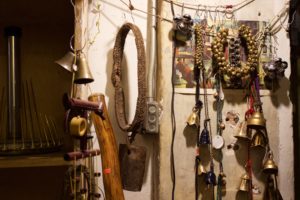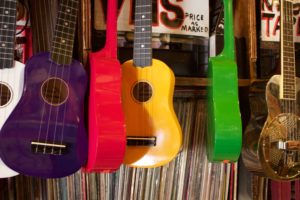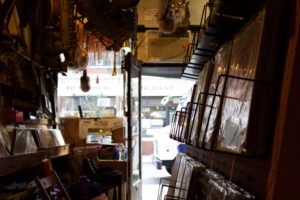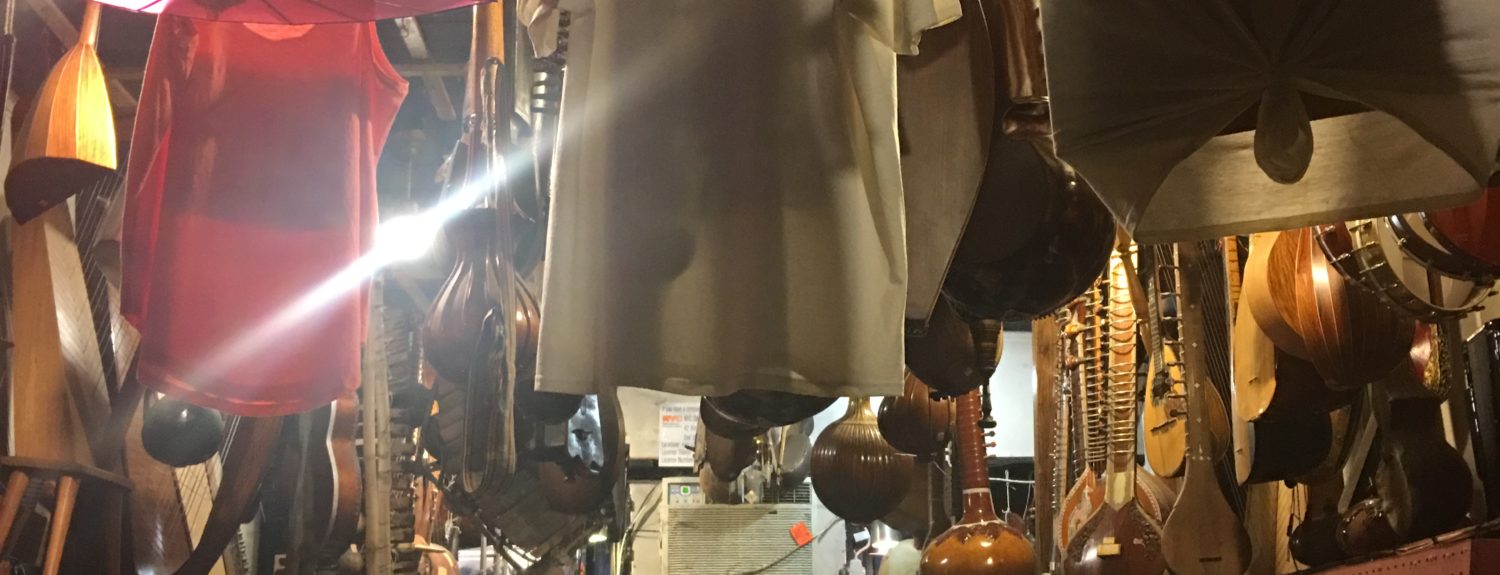Arts & Entertainment
Music Inn’s Worldwide Reach
By Lakhsmi Chatterjee
Spectrum staff
Space is so limited at Music Inn World Instruments that sitars, flutes, drums and assorted instruments from around the globe are strung along the ceiling and vinyl records are piled on the floor of the two-story storefront.
 The store bills itself as one of the oldest world music merchants in New York City. But patrons are attracted to much more than its instruments.
The store bills itself as one of the oldest world music merchants in New York City. But patrons are attracted to much more than its instruments.
Katie Silva, 24, has been to every open mic that Music Inn has hosted in the last year, even though she’s never performed during one of those sessions. “I come out here for the music and the people,” she said. “I stepped foot into this small store with a huge banner in front and just got intrigued.”
Its 59-year history is part of Music Inn’s appeal to its employees. Joe Smith, 28, started working there more than five years ago. He calls the store one-of-a-kind, a standout in the “amusement park” that is New York City.
“Especially in this area, where most of the residents are students that leave after four years … this store has been embedded into history itself,” he said.
Smith shares this snippet of Music Inn’s past: Jerry Halpern opened the store in 1958 as a mere record shop. As the folk music scene grew in Greenwich Village, Halpern started trading guitars as well. A roommate of iconic artist Andy Warhol introduced sitars to Halpern, so he added those stringed instruments from India to the store’s inventory soon after.
In the 1970s, as U.S. immigration rules were relaxed, African immigrants flowed into the Big Apple. That’s when Halpern got into African drums, especially the West African djembe, which Music Inn also sells.
Jeff Slatnick, who’d studied classical Indian music at California’s Ali Akbar College, got hired around that time. “Jeff was torn between traditional and new music,” Smith explained. “So he decided to make Indian music electronically.”
Slatnick inherited the store from Halpern in 1999 and invented the Zarod-Limulus, a horseshoe crab-shaped, stringed, electronic instrument meant to sound like “a sitar from the future,” Smith said.
Today, Music Inn, on any given day, stocks roughly 300 instruments. Its more than 10,000 vinyl LPs were printed as far back as the 1910s, though vinyl also is being newly pressed as a younger generation discovers it.
The venue’s Thursday open mic sessions happen on a small stage that can hold two people and a microphone at once, but hardly anything else. Admission is $5.
Kaizer Hossain, 24, a rapper from Long Island City, heard about Music Inn from a friend and decided to stop by and perform live for the first time in early July. “Anyone new to performance can test the waters here and come out better,” said Hossain, whom a Music Inn employee backed up by pounding some electronic beats out on a Launchpad.
 Some who live in the neighborhood said they come to the store every week. Some come daily. Gene Reynolds, 81, is one of the daily visitors. The Maryland native discovered the store when the U.S. Air Force stationed him in New York City in the 1980s. Music Inn was three blocks away from his military office, so he decided to walk in on an open mic session and sing such jazz classics as “Somewhere, Beyond the Sea.”
Some who live in the neighborhood said they come to the store every week. Some come daily. Gene Reynolds, 81, is one of the daily visitors. The Maryland native discovered the store when the U.S. Air Force stationed him in New York City in the 1980s. Music Inn was three blocks away from his military office, so he decided to walk in on an open mic session and sing such jazz classics as “Somewhere, Beyond the Sea.”
“Sometimes the bad things lead you to good things,” said Reynolds, adding that he’d had a rough time as a schoolboy and some rough times in the military. “Singing led me to a new door and new place to spend my days.”
For their part, the employees welcome Reynolds and regulars. Also, the employees repair customers’ damaged instruments. They let just about anyone play any instrument they want, even if the curious have no instrumental experience.
Although the store mainly caters to instrumentalists, singers and songwriters also are regulars. Juan Pablo Munoz, whose stage name is Manchado, is a 21-year-old singer-songwriter of electronica pop from Bogota, Colombia. He drops in almost weekly to take advantage of the relaxed atmosphere.
“There are no rules here,” he said, laughing. “You can try whatever you want and be as weird as you want. The employees and Jeff are very genuine people—unlike most of New York.”





